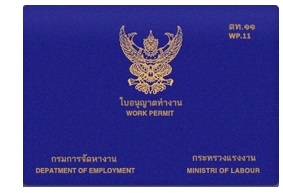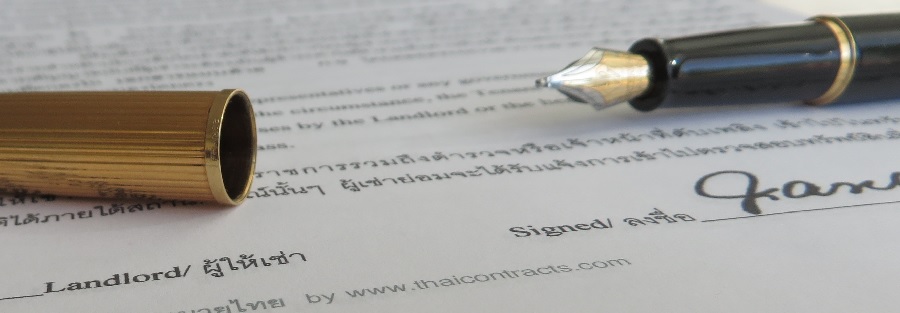Foreign Business
work permit in Thailand
Note that work under the Foreign Employment Act is described very broadly, i.e. working by exercising one's physical energy or employing one's knowledge, whether or not for wages or other benefits. The law does NOT define work as doing something in return for financial or any other reward. Working without a valid work permit leads to fines, possible imprisonment and deportation out of Thailand.
 Foreigners working in Thailand
Foreigners working in Thailand
(note: rules and regulations change regularly, information in this page is intended as a general introduction to 'work permits Thailand' and may not be fully up-to-date)
The application of a work permit
To be able to legally work in Thailand the foreigner must have a valid visa and a work permit issued in his name. Secondly, foreigners are only allowed to perform work that does not violate the Alien Employment Act (i.e.not engage in work prohibited for foreigners). What the foreigner is allowed to do and where under his work permit is described in the work permit. For example, foreigners working for 2 different companies doing the same work, must have 2 work permits, one for each company.
The applicant of a work permit must be in the possession of a valid non-Immigrant visa at the time they of processing the work permit application, however it is possible to start a work permit application for the purpose of obtaining a Non-Immigrant class B (business) visa (i.e. some embassies around Thailand require a valid work permit or a work permit application form (WP 2) as one of the conditions for issuing a non-immigrant class B (business) visa).
More info in visas
- Ministry of Foreign Affairs (information for visitors to Thailand)
- Thai Visa Forum (and work permits)
There are a number of grounds upon which a work permit can be granted (this is in a discretionary basis will take into account usual considerations such as suitability and qualifications of the foreigner for the position). The permit may be granted to a foreigner who is employed in Thailand and;
- The company (employer) must have a fully paid-up registered capital of 2 million Baht to hire one foreigner, plus one person for every additional 2 million Baht (to a maximum of 10 people).
- If the registered capital of the company is less than 2 million the company can hire one foreigner if its total corporate income tax payment had been at least 5 million Baht for the past three years. The company can hire one foreigner for every 5 million Baht paid in tax.
- The employer has engaged in export which has brought into Thailand revenue of 3 million Baht in the previous fiscal year. The employer can hire one foreigner for every additional 3 million Baht up to a maximum of 3 people.
- The employer has at least 50 Thai employees per foreign employee up to a maximum of 5 foreign employees.
- A foreign employee must have paid personal income tax in the previous personal tax year (based on the minimum income requirement for his nationality) or if the foreign employee has not worked in Thailand previously, documents for potential employers confirming that, the foreign employee will obtain income in Thailand at lease in the amount of minimum income as specified based on the foreigners nationality.
The Labour Department may also issue or renew work permits regardless of the above criteria when the foreign individual falls into one of the following categories:
-employed as an international trade representative inspecting product quality, purchases or conducting market surveys
-employed as an investment or management technology adviser or internal auditor
-a tour representative bringing foreign tourists into Thailand
-employed in an international financial institute endorsed by the Bank of Thailand
-employed a non-profit organization on a temporary basis
-employed as a contractor on projects for state agencies or public enterprises
-employed in a business that mainly required the use of local raw materials
-employed in the Thai export sector
-employed in a business introducing and transferring technologies to Thailand
-employed in a sector where qualified Thai employees cannot be found
-married the cohabiting with a Thai national and has an honest employment.
In order to apply for one standard foreign employee's work permit in a limited company the employer/ foreigner is required to submit the documents as listed below:
- Application form signed by the employee;
- Letter of employment from your company signed by the authorized Director of the company;
- Company Affidavit/ Certificate of Incorporation and a copy of the list of shareholders (copies signed by authorized director);
- Audit report, balance sheet for 3 preceding years. If you do not have this, we have to provide an explanation letter stating that the company is less than 12 months old. The authorized Director is required to sign this letter;
- Employee’s personal income tax declaration form or withholding tax form. A failure to show that tax has been paid correctly will seriously prejudice the employee’s work permit application;
- A written report stating the employee’s activities and declaration that the activities comply with the conditions stipulated in the work permit booklet. The authorized Director is required to sign this report;
- Map of the location of the company signed by the authorized Director;
- Copy of the foreign employee’s passport (every page) plus the page showing a valid Non-immigrant visa stamp. The employee is required to sign each page in blue ink.
- Health certificate from a certified Thai doctor (including specific test like syphilis)
- 3 colour photographs of the employee (5cm x 6cm)
- Certified copies of the employee’s educational certificates (Degree or Diploma) and qualifications for the job.
Documents numbered 1 – 7 must be signed by the authorized Director of the company and the company’s seal must be affixed. Document number 8 must be signed by the employee (every page) to certify that it is a true copy. Document number 9 must be an original health certificate as issued by qualified and certified Thai doctor within Thailand. Most general hospitals issue such a document (cost should be not more than a few hundred baht).
Minimum income requirement for foreigners working in Thailand
From the 10 th of July 2004 , foreigners applying for non-immigrant visa extensions for employment in Thailand will have to meet an increased minimum monthly salary requirement by nationality and amount. It should be noted that this regulation applies to employees in the corporate sector (profit-making business). Employees with lower monthly salaries in other professions, such as teachers, can apply for non-immigrant visa extensions and work permits for employment in Thailand provided that the are able to provide an official letter of confirmation from a relevant government agency.
| Country | Previous | Last (not updated) |
| Canada, Japan, United States | 40,000 THB | 60,000 THB |
| Europe (incl. UK) Australia | 35,000 THB | 50,000 THB |
| Hong Kong, Malaysia, Korea, Singapore, Taiwan | 30,000 THB | 45,000 THB |
| China, India, Indonesia, Middle East, Philippines | 25,000 THB | 35,000 THB |
| Africa, Cambodia, Laos, Myanmar, Vietnam | 20,000 THB | 25,000 THB |
| Persons working for newspapers in Thailand | 12,000 THB | 20,000 TH |
Related: Ministry of Labour(external) this website contains new laws and translations of relevant existing Thai laws including Ministerial Regulations, such as 'the Alien Employment Act' which was enacted to control employment by foreigners and the issuance of work permits to foreigners to reserve certain occupations for Thai nationals, 'the Labour Protection Act B.E. 2541 (1998)' , specifying the rights and duties of employers and employees in Thailand, and the 'Social Security Act B.E. 2533 (1980), this Act requires the collection of contributions paid by employers, employees, and the government for use in providing protection and welfare in respect of non-work related injury or sickness or invalidity or death, or maternity or child allowance or old-age, or unemployment to employees who are insured persons: - labour law.
Employment general
The rights and duties of the employer and the employee are generally governed by the Labour Protection Act(LPA) and the Civil and Commercial Code. Generally, under Thailand employment laws an agreement between the employer and the employee cannot be less than the minimum standards or requirements set by law.
The maximum probationary period permissible under Thai employment law is 120 days. All employers are required by labour law to provide at least 13 official public holidays per year, and six vacation days after one full year of service. Apart from salary, all benefits arising from employment are regarded as assessable income subject to withholding tax at a progressive rate.
Under Thailand labour law an employee is entitled to annual sick leave of 30 working days per year, with full pay. In addition to sick-leave, a pregnant woman is entitled to 90 days of maternity leave (inclusive of holidays), including 45 work days at full pay.
Employment termination with cause (in which event the employer can terminate employment without notice and/or compensation) is governed by the provisions of Section 583 of the Civil and Commercial Code and Section 119 of the Labour Protection Act, and includes gross negligence, willful disobedience, dishonesty or criminal act. When there is employment termination without cause, it is compulsory under employment laws that the employer make severance payment (in addition to notice) to the employee according to the length of unbroken service:
- - from 120 days but less than 1 year the amount is 30 days
- - 1 year but less than 3 years the amount is 90 days
- - 3 years but less than 6 years the amount is 180 days
- - 6 years but less than 10 years the amount is 240 days
- - 10 years and over the amount is 300 days
source: samuiforsale
Related:

